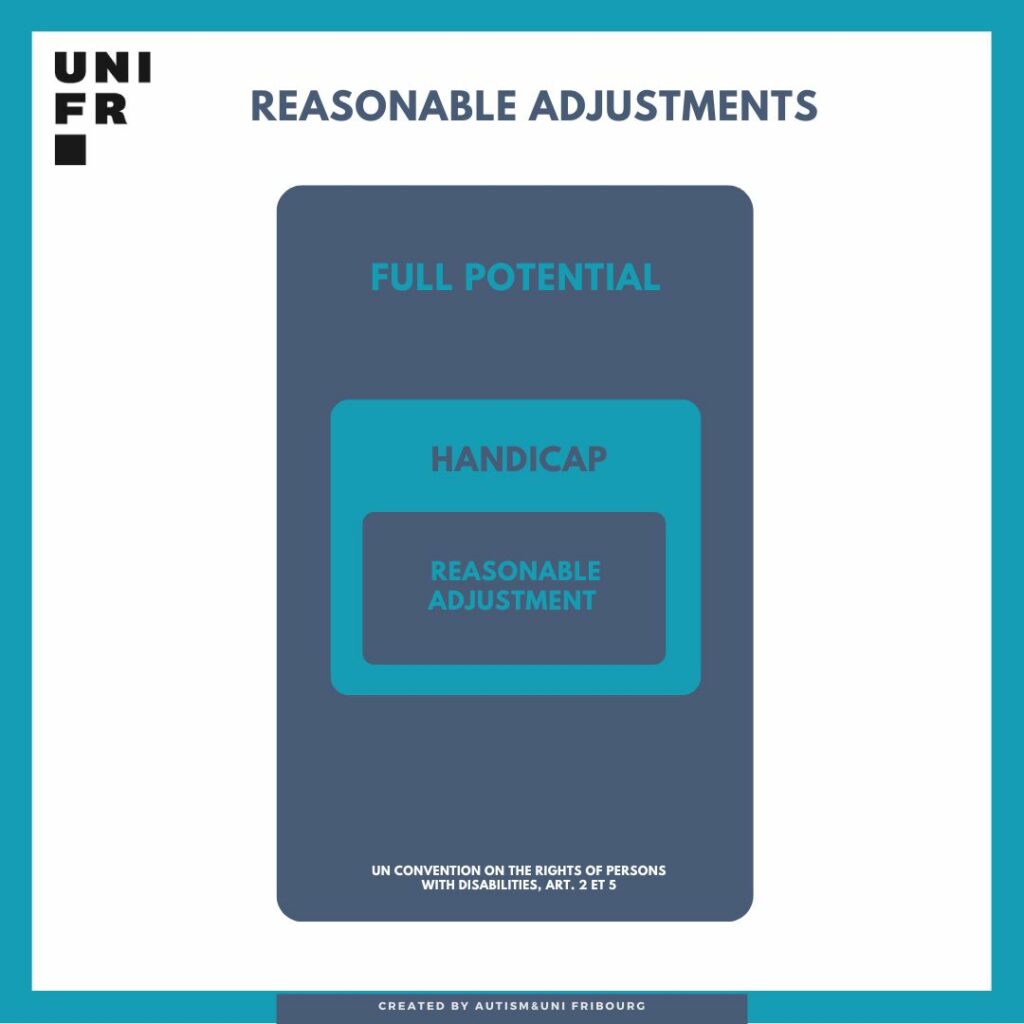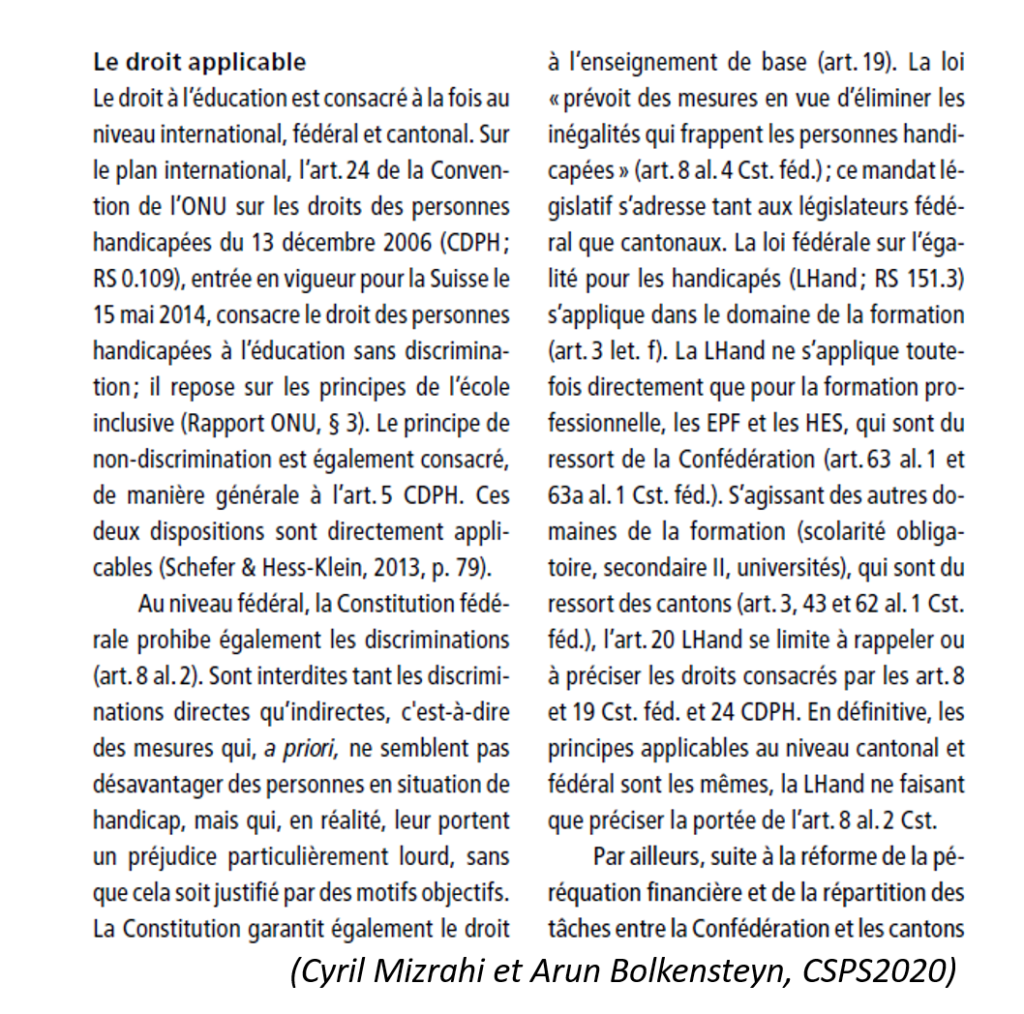This article will sort out what is true and what is false about the concept of reasonable adjustments, also known as “disability adjustment”.
Context
What is meant by “reasonable adjustments?
Reasonable adjustements are also called “reasonable accomodations” or “disability adjustments”.
“The right to reasonable accommodation is a component of the prohibition of discrimination (Art. 2 and 5 CRPD). According to art. 2 CRPD, it is “necessary and appropriate modifications and adjustments not imposing a disproportionate or undue burden, where needed in a particular case, to ensure to persons with disabilities the enjoyment or exercise on an equal basis with others” of a fundamental right, in this case the right to education. These accommodations may be formal or substantive” (Mizrahi and Bolkensteyn, 2020).
The content below is taken from the article by Bolkensteyn and Mizrahni (2020).
Prohibition of discrimination and reasonable adjustments
- “(…) there is inequality in access to training or further training, in particular if the use of aids specific to the disabled or personal assistance required by them is not granted (Art. 2 para. 5 let. a LHand) or if the duration and design of the training services offered and the examinations required are not adapted to the specific needs of the disabled (Art. 2 para. 5 let. b LHand)
- The right to reasonable accommodation is a component of the prohibition of discrimination (arts. 2 and 5 CRPD). According to art. 2 CRPD, it refers to “necessary and appropriate modifications and adjustments not imposing a disproportionate or undue burden, where needed in a particular case, to ensure to persons with disabilities the enjoyment or exercise on an equal basis with others” of a fundamental right, in this case the right to education. These accommodations may be formal or substantive.
- Formal adjustments, also known as measures to compensate for disadvantages, consist of “neutralizing or reducing the limitations caused by a disability. This term refers to the adjustment of the conditions under which an apprenticeship or examination takes place and not to an adaptation of the schooling/training objectives or an exemption from grades or subjects.
- “According to the case law, in order to determine the nature and extent of the compensation, account must be taken of the arrangements necessary for a disabled candidate to have the same chances of passing the examination as if his or her disability did not exist (Federal Administrative Court decision B-7914/2007, ATAF 2008/26, para. 4.5). Thus, it is not an incentive to give the person concerned an advantage over others. Furthermore, the right to compensation exists irrespective of the fact that a person has obtained or would probably obtain good grades even without the measure.
Key points for Switzerland:
- Right to education for all
- Prohibition of direct and indirect discrimination.
- An Act aimed at the elimination of inequalities
What does that have to do with me?
In practical terms, this means that in all environments, whether school, university, work or society, everyone should try to minimise the disadvantages created by a disability as much as possible, without giving the person concerned an advantage by making these adjustments. For example, if a person uses a wheelchair, a ramp is proposed so that he or she can access the same places as if he or she were walking, or if he or she is hard of hearing, subtitles are proposed. For autism, these accommodations could be as follows:
- In compulsory school: allow the pupil to go to a quiet place during lunch break to rest, give instructions in writing or allow the highlighting of useful information, support the pupil to join peers in group work, discuss complex social situations.
- At the University: allow exams to be done in a quiet room, give course materials in advance, offer access to a resource person, support the student in organizing his or her credits, …
- In working life: organise a job coach for the first few weeks, assign a contact person for questions, organise the workplace sensitively, define the process for the instructions to be followed (see also the chapter on applying for a job for the first time)
What is the next step?
If you are at university and your autism is holding you back in your studies, contact the Studies and Disability office or the Autism&Uni team
Practical advice
- If you are in contact with someone affected by autism, find out if reasonable accommodations and adaptations have been made on your end.
- If you are concerned by autism, you may not need any special support.
- If you are concerned about autism and you realise that your autism is holding you back, try to identify these barriers: perhaps organisation is particularly difficult for you, or sensory aspects are distracting, or perhaps you have difficulty organising a sleep pattern, or you have challenges with social interactions in group work.
- See if you can find resources to help you overcome these difficulties yourself
- Sometimes it doesn’t take much support to make a problem go away. Contact the Autism&Uni team to discuss your needs
- When we are in difficulty, we often feel like we are alone. The testimonies section will allow you to know other similar life stories
- Find out about the concrete and reasonable possibilities of compensating for the disadvantages in your case (if you are a student: from the Studies and Disability Office, if you are applying for a new job: from the Autism&Uni team or from the IA).
Questions to ask yourself
- If you ar in contact with a person on the autism spectrum
- Did you understand the diagnostic features related to the individual’s particular case?
- Have you made the difference between their real potential and the area hampered by their autism?
- Have you discussed this with the person concerned?
- Can you do anything at your level to help?
- If you are concerned by autism
- Do you feel held back from your full potential because of your autism?
- Can you describe how your autism hinders you
- Do you understand where you could be supported without having an advantage over your peers without autism?
- Do you know who to contact in case of doubt?
About the author
Edited by: Nathalie Quartenoud ©
Translated by: Daniel Dukes


 Back
Back 
